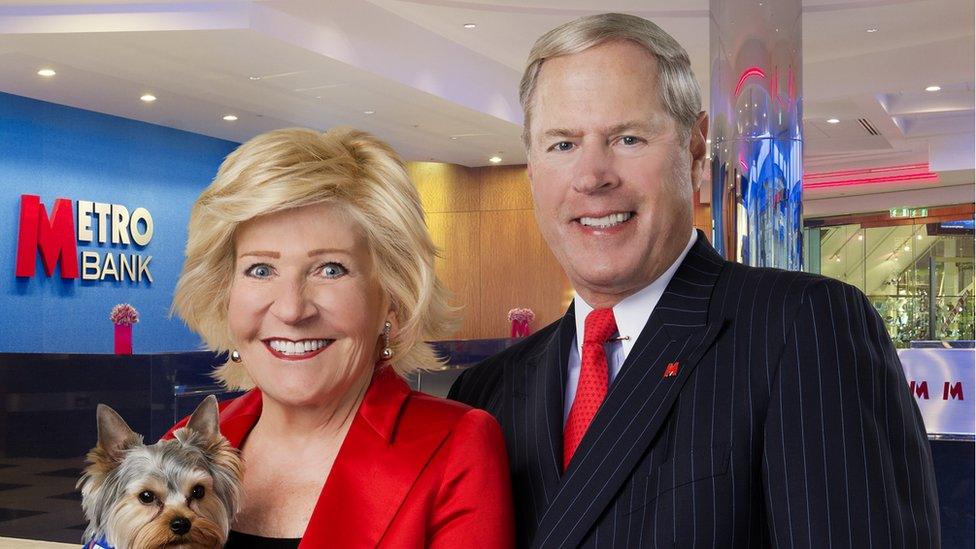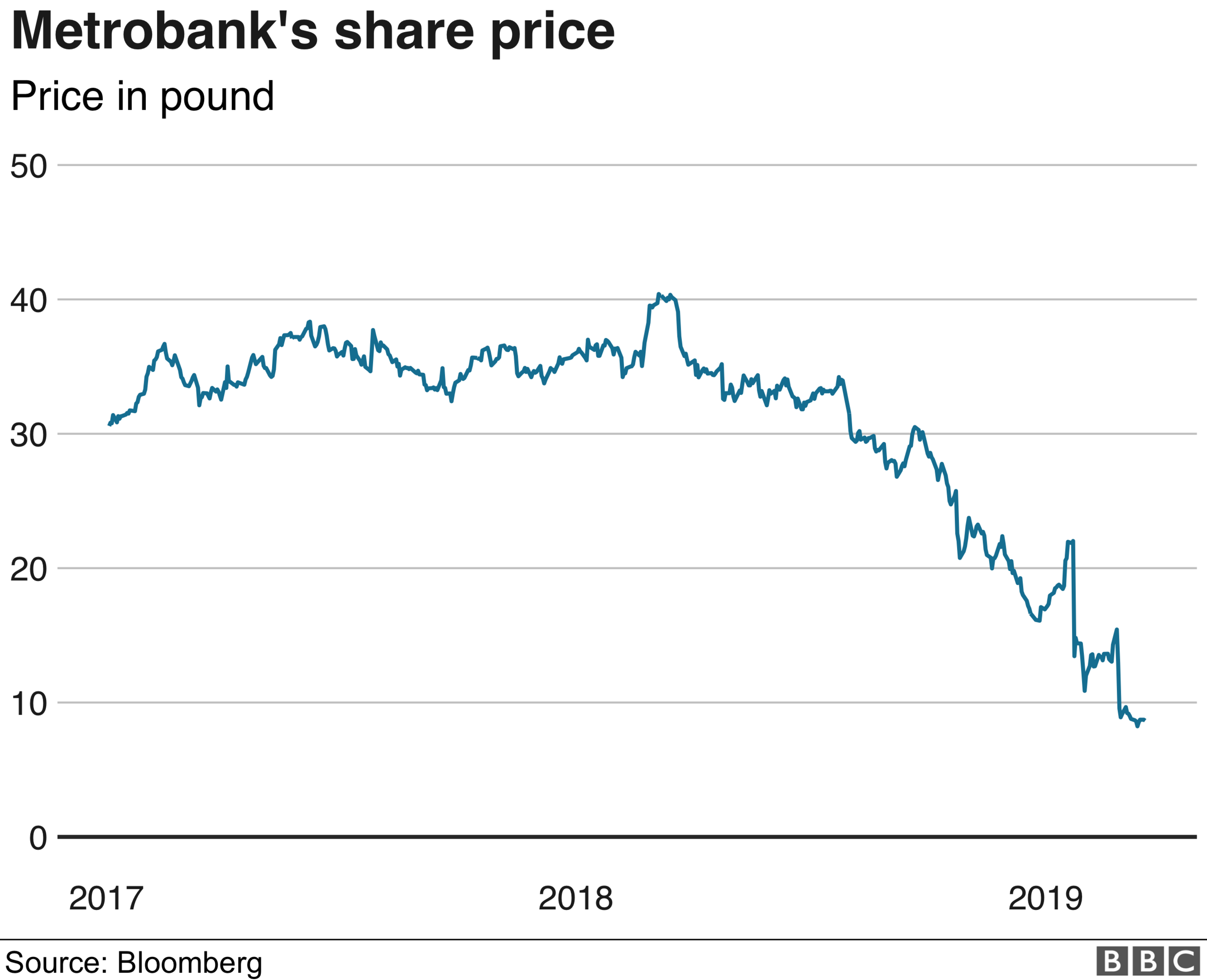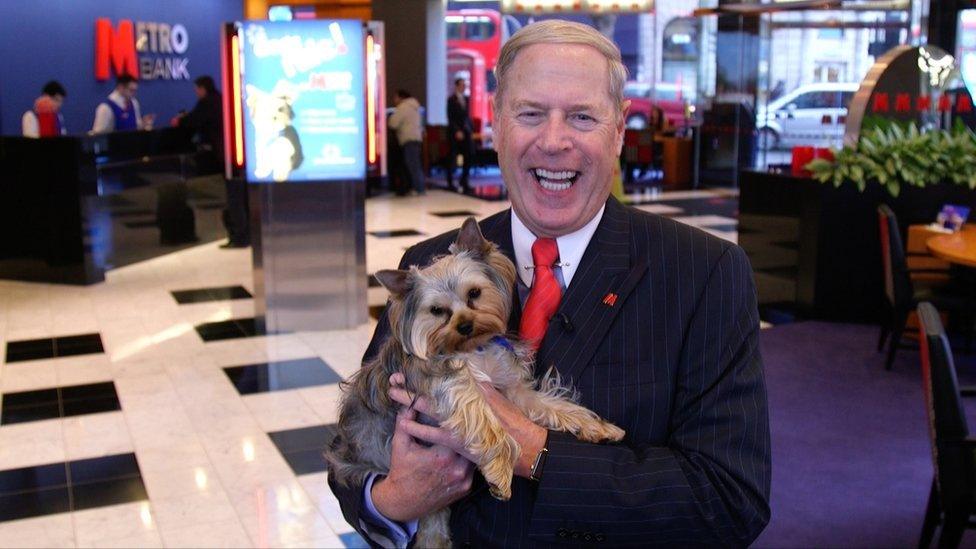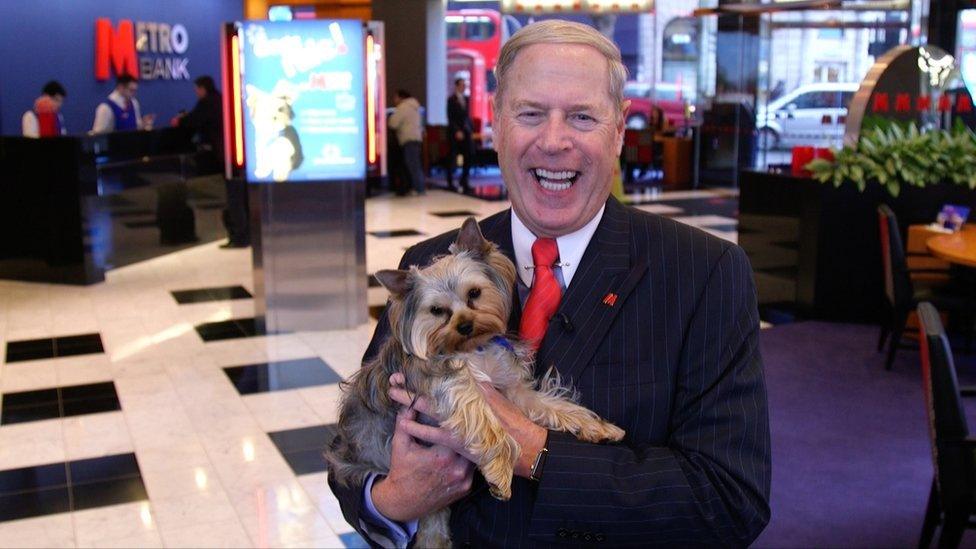Financial sharks circling Metro Bank
- Published
- comments

Metro Bank has paid £21m to Vernon Hill's wife's firm for its design work
Although Metro Bank recently came top of a consumer satisfaction league table, financial sharks are circling the challenger bank.
Metro Bank is now the second most shorted company on the UK stock market.
That means a lot of financial firms are betting the bank's shares will continue to fall - despite having already lost 80% of their value in the last 12 months.
Ever since Metro Bank revealed it had made an error in calculating how much shock absorbing capital it was holding, there have been some serious questions in the minds of regulators about the bank's operating competence and in the minds of investors about its basic business model.
So what's been going on?
Earlier this year the financial regulator, the PRA, raised concerns with the bank about inconsistencies in the reports it was submitting.
It soon emerged that the bank had miscalculated the capital it needed to support some of its commercial lending. The news sent the bank's shares down nearly 40% in one day as the bank said it would need to raise more capital by selling new shares.
Miscalculating the amount of capital you have or need to support your lending is one of the most fundamental mistakes a bank can make.
The bank's capital is a financial cushion to make sure that depositors' money is safe even if some of the borrowers can't pay back their loans.
One banking veteran told the BBC that it was "staggering, beggared belief" that a bank could get such a basic thing so wrong. "Operating with insufficient capital is the cardinal sin that brought us the financial crisis".
Metro Bank is clear that it had sufficient capital to support its current lending but analysts told the BBC that future growth plans also need to be supported as it planned to grow faster than it could earn additional money to support future lending.
Capital calculations
The amount of capital a bank needs is calculated by adding together three elements - or pillars - as they are known.
Pillar one is the basic minimum capital calculation based on how much lending you have done and in which markets - the more you do, the riskier the types of loans - the more you need.
Pillar two is the regulators assessment of bank specific risk. It's a qualitative measure that looks at the bank's size, maturity and operating history.
Pillar three is the amount you need to support future growth.
This is an important one for Metro which was trying to grow at 30% per year - which would require more additional capital than the bank could earn along the way.

Well, those plans have changed. As Metro Bank licks its wounds after an embarrassing mistake, it has had to scale down its ambitions.
It is now targeting growth of 20% rather than 30% - and that looks ambitious given the bank will be spending a considerable amount of money and management time dealing with two regulatory probes from the Financial Conduct Authority and the Prudential Regulation Authority.
So far - no heads have rolled as a result of the capital blunder. The chief executive Craig Donaldson offered to resign but the board did not accept it.
Sources at the company told the BBC there was no appetite for "a witch hunt" but investors and regulators may need some blood on the carpet to satisfy them.
If the chief executive stays, the focus then shifts to the board and here is another area where investors are concerned that Metro Bank is falling short of the standards required of a bank.
Sense of fun
The chairman and founder Vernon Hill is an engaging and charismatic figure whose mould breaking approach to banking was seen by many as a breath of fresh air.
I was present at the launch of the first UK Metro Bank in Holborn, London nearly 10 years ago. There was razzmatazz, balloons, bands, Saturday, Sunday and Bank holiday opening hours and dog bowls and biscuits - thanks to the influence of Vernon Hill's wife Shirley and her ever present companion Duffy the Yorkshire Terrier.
So what? Just what the High Street needs - a bank that's open when you want it to be with a sense of fun about it.
Customers liked it. What investors were unsure about was the £21m Metro Bank paid to Shirley Hill's company InterArch for its design work.
Royal London Asset Management and Glass Lewis - a firm that advises shareholders how to vote - both described the relationship as "inappropriate" and voted against Vernon Hill's re-election as chairman. They were convincingly outvoted.
Many of the board have been there a long time - a practice that is increasingly frowned upon as it can foster cosy relationships between the board and the management - leading to insufficient challenge and scrutiny.
Six of its nine non-executive directors have been on the board almost since day one - nine years ago - coincidentally the maximum recommended term for a director under the company governance code.
Even if, as seems likely, there is a boardroom clear out, doubts still remain in the minds of some about the underlying business model.

Metro Bank chair Vernon Hill with dog Duffy
After all, Metro Bank is trying to do the exact opposite of what many other banks are doing.
It is growing its network of branches while others are shrinking theirs. It is opening in the most expensive locations in the towns and cities it operates in. Its branches are open Saturdays, Sundays and Bank Holidays.
Sometimes doing something counter-intuitive or a bit different is good. Sometimes there is a reason that no-one else is doing it. For many investors, it's a case of the latter.
A gamble
One former shareholder said there were two important reasons why. First, this Metro Bank model "will only ever appeal to a subset of customers - it is never going to be the same scale as even a TSB let alone a Lloyds and that matters because you can't get the cost as percentage of your revenue down without scale.
It will always be a more expensive business and therefore lower returning business to own".
Second, the rate of growth they are targeting means that for the next few years you are paying to own this company rather than being paid.
The bank will continue to need more capital put in by shareholders and that is a gamble for a niche bank that is expensive to run.
The chief executive Craig Donaldson insists that comparisons with the rest of the industry tell a misleading story.
"You have to remember that RBS is coming down from over 2,000 branches, we are heading up from the current 66 to a target of 200. That is the size of business we are targeting."
As mentioned already, Metro Bank has proved popular with customers and has shown impressive growth with minimal advertising. To be clear there is no suggestion that customer deposits are at any risk.
But the model is not winning the popularity contest with investors - its shares have fallen nearly 80% and some heavyweight financial gamblers are betting heavily on it falling further.
In the final analysis, no amount of razzmatazz and dog biscuits can take investors eyes off the financial ball and right now it is a long way from being in the back of the net.
One to watch.
- Published27 February 2019

- Published15 February 2019

- Published4 January 2016
